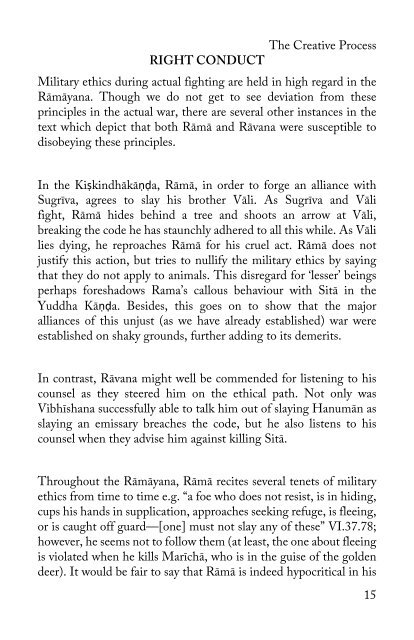The Creative Process: The Arts of War (Spring 2017)
The Creative Process is The Mumbai Art Collective's flagship magazine.
The Creative Process is The Mumbai Art Collective's flagship magazine.
Create successful ePaper yourself
Turn your PDF publications into a flip-book with our unique Google optimized e-Paper software.
<strong>The</strong> <strong>Creative</strong> <strong>Process</strong><br />
RIGHT CONDUCT<br />
Military ethics during actual fighting are held in high regard in the<br />
Rāmāyana. Though we do not get to see deviation from these<br />
principles in the actual war, there are several other instances in the<br />
text which depict that both Rāmā and Rāvana were susceptible to<br />
disobeying these principles.<br />
In the Kiṣkindhākāṇḍa, Rāmā, in order to forge an alliance with<br />
Sugrīva, agrees to slay his brother Vāli. As Sugrīva and Vāli<br />
fight, Rāmā hides behind a tree and shoots an arrow at Vāli,<br />
breaking the code he has staunchly adhered to all this while. As Vāli<br />
lies dying, he reproaches Rāmā for his cruel act. Rāmā does not<br />
justify this action, but tries to nullify the military ethics by saying<br />
that they do not apply to animals. This disregard for ‘lesser’ beings<br />
perhaps foreshadows Rama’s callous behaviour with Sitā in the<br />
Yuddha Kāṇḍa. Besides, this goes on to show that the major<br />
alliances <strong>of</strong> this unjust (as we have already established) war were<br />
established on shaky grounds, further adding to its demerits.<br />
In contrast, Rāvana might well be commended for listening to his<br />
counsel as they steered him on the ethical path. Not only was<br />
Vibhīshana successfully able to talk him out <strong>of</strong> slaying Hanumān as<br />
slaying an emissary breaches the code, but he also listens to his<br />
counsel when they advise him against killing Sitā.<br />
Throughout the Rāmāyana, Rāmā recites several tenets <strong>of</strong> military<br />
ethics from time to time e.g. “a foe who does not resist, is in hiding,<br />
cups his hands in supplication, approaches seeking refuge, is fleeing,<br />
or is caught <strong>of</strong>f guard—[one] must not slay any <strong>of</strong> these” VI.37.78;<br />
however, he seems not to follow them (at least, the one about fleeing<br />
is violated when he kills Marīchā, who is in the guise <strong>of</strong> the golden<br />
deer). It would be fair to say that Rāmā is indeed hypocritical in his<br />
15



